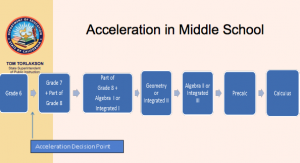The State Board of Education ended a decade-long controversial policy of pushing eighth graders to take Algebra I when members voted unanimously Wednesday to strip California’s Algebra I standards from the state’s eighth grade math standards.
Those standards will now mirror the national Common Core standards, which do not include Algebra I for eighth graders. The State Board will create curriculum options to accelerate math-taking in middle school and high school and to leave it up to local districts to determine who’s eligible for them. About two-thirds of eighth graders enrolled in Algebra I last year. That number is likely to decline; supporters of Common Core argue that many will be better off taking it a year later.
Board members stressed that the new approach is not a reversal but a more nuanced policy encouraging Algebra I in eighth grade for students with the skills to handle it and a vote of confidence in Common Core’s more gradual approach to algebra mastery.

Ilene Straus said the goal should be to encourage students to take Algebra I when they are ready.
“The intent is not to water down standards but to deepen rigor,” said Ilene Straus, the vice president of the Board, who is a former school principal. “The concern of some in the field is that they don’t want to lose incentives for students to take algebra, but not (for them to take the course) before they are ready.”
The board’s vote resolves 2½ years of uncertainty. Facing a deadline in August 2010, previous members of the State Board adopted an amalgam of Common Core and California math standards that reflected the division between those who favored Common Core’s approach to math – incorporating fewer concepts, developed in depth, leading up to a full Algebra I course in ninth grade – and those who favored universal Algebra I in eighth grade.
Some seventh and sixth grade Common Core standards were pushed down to a lower grade to create a pathway for students to take Algebra I in eighth grade. The eighth grade standards adopted in 2010 consisted of two full sets of standards: eighth grade Common Core, including some algebra concepts like functions, and a full set of the old California Algebra I standards. This apparently put the state in conflict with the federal government’s requirement under the No Child Left Behind law that states offer only one set of standards per grade. It also created confusion for committees creating curriculum guides or frameworks and criteria for textbooks and materials.
Last year the Legislature jumped in to restore order. Its passage of SB 1200 also foreshadowed this week’s vote. It authorized the State Board to amend math standards to eliminate duplication, save expense (no more unique California standards) and adopt a Common Core version of Algebra. That’s what the Board voted 10-0 to do yesterday.
In providing an incentive for districts to enroll students who might not otherwise have taken the course, California’s current policy of docking API scores of schools that don’t offer Algebra I in eighth grade has proved to be controversial and, by some measures, very successful.
As Board member Trish Williams (the former executive director of EdSource) noted, in the past nine years the percentage of African American enrollment in eighth grade Algebra went from 24 percent to 60 percent, while those testing proficient on the California Standards Test (CST) doubled to 36 percent. For Latinos, enrollment nearly tripled to 63 percent, while the proficiency rate also doubled, to 42 percent.
For minorities that had been denied access to a course leading to college, she said, the “social justice concerns are not insignificant.”
But at the same time, Williams and others acknowledged that 60 percent of the eighth grade minority students in Algebra I did not test proficient on the CST. Many were required to repeat the course; of those, only one in five ended up scoring proficient on the CST. And if they did get a passing grade in Algebra I, they then “hit a wall in Algebra II,” becoming discouraged or failing the course.

Bill Honig, right, and Tom Adams lay out the strategy for Common Core at State Board meeting (click to enlarge).
There is no disagreement that eighth grade Common Core math will be more challenging than the course now taken by students not enrolled in Algebra I. “We cannot call it pre-algebra,” said Bill Honig, chair of the Instructional Quality Commission, which is guiding the implementation of Common Core. “It is not a watered-down course; it is demanding.”
Honig and supporters of Common Core are confident that students who take Common Core eighth grade math will be better prepared to succeed in ninth grade, when they will take Common Core’s version of Algebra I. In his testimony before the State Board, Mark Sontag, curriculum coordinator for math and science in Irvine Unified, said that a decade under the current California math standards produced “a generation of students that were technicians rather than mathematical thinkers.” Under Common Core, students will understand and be able to explain math concepts, he said.
Paths for acceleration

Students identified as candidates for Algebra I in eighth grade may start accelerating their way through the standards in sixth grade, under one possible scenario (click to enlarge).
Over the next several months, the committee creating the math curriculum frameworks will create the pathways that districts could adopt to accelerate math so that students will be ready for Calculus. One option could be to offer Algebra I in eighth grade; another could be to combine two years of high school math into one, as Massachusetts is planning. Publishers will be asked to include accelerated math in the materials they design, said Tom Adams, the Department of Education’s director of curriculum frameworks and instructional resources.
But those who advocated eighth grade Algebra dismissed promises of alternative pathways. Doug McRae, a retired testing specialist from Monterey and frequent critic of the state’s policies on testing and accountability, said that the Board should have insisted on clear language in the standards stressing acceleration to Algebra I. He also disputed Adams’ and Honig’s claim that the federal government, for accountability purposes under NCLB, will permit the state to offer only one set of standards with one test per grade. Massachusetts is designing a second test for those taking Algebra I in eighth grade that will meet federal government’s technical requirements, he said.
“What you test for is what you teach,” said McRae. If Algebra I isn’t tested in eighth grade, then districts will take the path of least resistance and not encourage students to take it.

Patricia Rucker says the State Board must delve into how districts decide who takes Algebra I.
Districts or perhaps individual math teachers in each school will ultimately decide who’s ready for Algebra I or another accelerated course in eighth grade. The State Board’s policy will be neutral, without incentives.
But Board member Patricia Rucker reminded the Board that decisions by local educators about whether to place students in Algebra I have been failing the majority of students, so it’s not sufficient to say the Board has no role in the outcome. What was in the district’s placement decision that resulted in a student failing? she said. “We need to know. We don’t want kids coming out saying, ‘Math is not for me’ or ‘I am horrible in math,’ because we started them too soon or without the supports they need.”
To get more reports like this one, click here to sign up for EdSource’s no-cost daily email on latest developments in education.












Comments (10)
Comments Policy
We welcome your comments. All comments are moderated for civility, relevance and other considerations. Click here for EdSource's Comments Policy.
Farhana Islam 9 years ago9 years ago
I am also all for increasing academic rigor and common core definitely has its good points. However, districts should not push kids down when they are ready to accelerate using scare tactics, personal prejudices, etc. That is just not fair. Education should be a fun, exhilarating process. Some kids are able to get through and understand three years of common core math (Common Core 6, Common Core 7, and Common Core 8) in one year. … Read More
I am also all for increasing academic rigor and common core definitely has its good points. However, districts should not push kids down when they are ready to accelerate using scare tactics, personal prejudices, etc. That is just not fair. Education should be a fun, exhilarating process. Some kids are able to get through and understand three years of common core math (Common Core 6, Common Core 7, and Common Core 8) in one year. Other kids may need two years. And then there will be kids who need all three years and maybe a little more. Understand that each child has different needs and capabilities. Allow room for exceptions at both ends of the spectrum. Don’t treat the children like cows and herd them into groupings based on “how things should be”.
Jane Nguyen 9 years ago9 years ago
I’m a 7th grader that knows how to do algebra 1, sophomore geometry, and some trig.
I can’t believe the school places me in regular 7th grade math. Common Core justs has more word problems. I can do word problems quickly and do lots of mental arithmetic.
Jan 9 years ago9 years ago
Historically, algebra was taught in 10th to 11th grade. I'm in my late forties now, went to a pretty competitive school district in an affluent, highly educated area, and in our school, the advanced kids took algebra in *ninth* grade. Even kids going into engineering, etc., very commonly took algebra, geometry, and trig in high school, and calculus in college. And this system, for several generations, produced very competent … Read More
Historically, algebra was taught in 10th to 11th grade. I’m in my late forties now, went to a pretty competitive school district in an affluent, highly educated area, and in our school, the advanced kids took algebra in *ninth* grade. Even kids going into engineering, etc., very commonly took algebra, geometry, and trig in high school, and calculus in college. And this system, for several generations, produced very competent STEM people — these were the guys who developed the space program, started the first Silicon Valley companies, etc. Yes, some kids even then took math on a more accelerated track – but that was the exception, not the rule. And this did not represent “dumbing down” math at all. On the contrary, each subject was taught in greater depth, with more mastery than is commonly true since shifting algebra down to 8th grade. I work as a teacher aide in middle school, and commonly see kids who can’t do algebra both because they’re not developmentally ready for the degree of abstraction and complexity, and because they haven’t thoroughly mastered arithmetic yet (pretty common to see kids still counting on their fingers in algebra class). There is no magic to helping the kids master these concepts; it’s just a question of more time to practice them. In addition, as more sophisticated neurological imaging studies are becoming available, it’s also becoming clear that certain areas of the brain that deal with organization and other high level skills necessary to advanced math develop later. Shifting math down into eighth grade was based on the foolish assumption that “faster, faster faster!” = “better, better, better!” I’m all for academic rigor — give kids plenty of practice, individual help where they need it, make sure each subject is solidly mastered. But we shouldn’t mistake hurry for rigor. Slowing down the timing for algebra is a long-overdue decision.
Christine R 10 years ago10 years ago
I will never understand for the life of me how standards testing are suppose to change how our students learn. I am a parent of an 11th, 9th and 6th graders. Academics is their top priority and nothing else. If you want to be happy, do something that will provide your that happiness. Until we change our culture, our education will never reach the top level that it should be. Being ranked … Read More
I will never understand for the life of me how standards testing are suppose to change how our students learn. I am a parent of an 11th, 9th and 6th graders. Academics is their top priority and nothing else. If you want to be happy, do something that will provide your that happiness. Until we change our culture, our education will never reach the top level that it should be. Being ranked 36th in education worldwide is very embarrassing coming from a country that has the most freedom, resources and opportunity for higher learning. Education starts at home and nobody should expect one teacher with 30-35kids to be able to teach a concept in depth and discipline at the same time. We as parents need to take the responsibility to make sure our kids succeed. It’s a TEAM effort between the school and home and there is no “I” in TEAM. Our culture of putting SPORTS as priority number 1 needs to change if we ever want to catch up to the rest of the world…if we ever want to be able to “compete in the global economy”.
I am all for the CC, but why are we pushing down the standards of our classes and putting our children in lower classes? Why are schools limiting and insisting to making ALL 7th graders only be in Pre Algebra? If a student is ready for Algebra 1 in 7th grade why would a school not allow that ? If a student is ready, it shows on their grades and test scores and if they are ready for the class then that means they are ready to learn more and will most likely do well in the CC. I cannot stand it when we set a standard and then we lower it so we can all look good. If an accelerated student is placed in a lower class for the sake of CC, that might just back fire because of boredom. If we are preparing them for college, then why are we pushing them back ONE WHOLE YEAR in pre-algebra is it’s not needed. I’m all for having it if the student needs it. But, for the love of education…let advance students continue to advance and don’t limit what where their potential can take them. How can they be ready for college if the highest math they will finish by senior year is Calculus I or AB ? When all the others they are competing with internationally to enter an American university completed all of Calculus I, II, III in AP and finished Statistics and then some. We keep writing policies and changing our standards…but we can’t even keep the standards without lowering it..so what is the point of changing it? How can someone who never learned all the add/subt and mult/div facts go forward or higher in math when they never even learned the basics of math. It all starts in the beginning, as early as kindergarten…so many students in 3rd grade can’t even complete the mult table…start from the beginning…math is a building block, if you don’t have the basic foundation..you will be lost entirely…this is why most American kids starts out with “I hate math”. In other countries, if you cannot recite your mult table by 1st grade, you are not going to 2nd grade. Here we have policies of promotion/retention…but we promote everyone…whether they are ready or not…and then later in their life, middle or HS they are suffering. Fix the root of the problem, don’t promote kids to the next grade if they are not competent. If they are competent, they become confident and self-esteem follows naturally. Self-esteem is not realized by telling them how great they are when we know how much they are not ! Wake up America ! We need to reclaim our status as the number one in the world..bet most people are still in denial that we are not. We can do it…start at HOME. Parents this is your JOB !
Lisa A. 11 years ago11 years ago
DEVELAs an educator and parent of 5. I truly believe that only some students are developmentally ready for Algebra I at that age. We as educators learn about stages and phases in child development…and completely ignore whether a child is developmentally ready for that level of complex problem solving.Imagine punishing a one year old for improper speech or a two year old that can’t spell. Yes some can… most can’t .
Lori Walton 11 years ago11 years ago
I am in agreement with this policy decision. However, I also believe that government wrongly believes that policy drives behavior. If outcome changes are desired, it is people who change people, not policy. Students and schools that struggle need strong leaders, support, resources and people collaborating to achieve shared community goals. No amount of interference, carrots, or sticks wielded by government can create the kind of change than compassionate critical citizens of a democracy can. … Read More
I am in agreement with this policy decision. However, I also believe that government wrongly believes that policy drives behavior. If outcome changes are desired, it is people who change people, not policy. Students and schools that struggle need strong leaders, support, resources and people collaborating to achieve shared community goals. No amount of interference, carrots, or sticks wielded by government can create the kind of change than compassionate critical citizens of a democracy can. Where the will to change exists a way will be found.
Replies
navigio 11 years ago11 years ago
"The Legislature recognizes that the principal plays a pivotal role in the life of a school. Research indicates that at schools where pupil achievement is higher than might be expected, principals provide strong leadership and support. Teachers at these schools report that their principals facilitate innovation, support teachers in efforts to promote new ideas, and assist staff to acquire needed skills and materials. Other studies show that the principal is the most effective agent for bringing about educational improvement. The Legislature … Read More
“The Legislature recognizes that the principal plays a
pivotal role in the life of a school. Research indicates that at
schools where pupil achievement is higher than might be expected,
principals provide strong leadership and support. Teachers at these
schools report that their principals facilitate innovation, support
teachers in efforts to promote new ideas, and assist staff to acquire
needed skills and materials. Other studies show that the principal
is the most effective agent for bringing about educational
improvement.
The Legislature further recognizes that although principal
leadership is essential to effective instruction, research shows that
many principals are neither prepared nor encouraged to be
educational leaders. According to principals and others,
administrator training does not always match responsibilities of the
job, and opportunities for continuing development are inadequate.”
– e.c. 44681
Manuel 11 years ago11 years ago
I have a different opinion: as a state, we are trying to shoehorn more students into the A-G requirement so as to increase the size of the cohort interested and able to major in STEM when in college. But this ignores the empirical fact that not all students can take Algebra I at the same time. This may be due to developmental and/or "cultural" issues (I'm sure there's some research out there proving why … Read More
I have a different opinion: as a state, we are trying to shoehorn more students into the A-G requirement so as to increase the size of the cohort interested and able to major in STEM when in college. But this ignores the empirical fact that not all students can take Algebra I at the same time. This may be due to developmental and/or “cultural” issues (I’m sure there’s some research out there proving why this is).
Why would your district (which one is it, may I ask?) stop teaching Algebra I to 7th graders in this particular school when they can take it and succeed on it (100% proficient? What are they? All gifted in math?) if the “incentives” are removed? Similarly, I’d expect the other middle school to give more preparation to 80% of the students who are not ready for Algebra I instead of herding them directly into it. (The other 20% will take Algebra I and will be happy campers.)
This talk of “incentives” implies that schools, in the past, were not putting enough students in the A-G math path because they were not forced to. Which brings me back to the “everyone goes to college” bit: given that both UC and CSU are supposed to cater only to the top 12.5% and 33%, respectively, (because that is what we are able to afford right now due to the Master Plan not being updated) isn’t it obvious that not all students can be in those rankings and, therefore, why are we wasting the students’ time and the state’s money into forcing them to take Algebra I (and pass it!) in order to graduate from high school?
I just don’t see why we have to drag the horse to the water’s edge and then, if it won’t drink, we’ll water-board it!
And let’s not get into the morass that is a yet-to-be-designed test to determine whether or not competency in Algebra has been achieved. Ugh!
Replies
navigio 11 years ago11 years ago
To be clear, I don't have the answer. My mention of understanding both sides of the argument was to point out that I often find myself arguing both ways. My anecdote was meant to show an example of how extreme disparity can exist locally. When it is between districts, this may be less of an issue since each district's policy could be tailored for their population (assuming its homogenous enough), but when a single district … Read More
To be clear, I don’t have the answer. My mention of understanding both sides of the argument was to point out that I often find myself arguing both ways. My anecdote was meant to show an example of how extreme disparity can exist locally. When it is between districts, this may be less of an issue since each district’s policy could be tailored for their population (assuming its homogenous enough), but when a single district must include teaching algebra in 7th grade as a policy in one school and algebra in 9th grade as a policy in another, then I think that introduces all sorts of problems that probably cannot be fixed other than to ‘segregate’ those abilities even more extremely than they currently are. I could have used comparisons between districts as well, for example a neighboring, extremely affluent district has 75% of their population taking algebra 1 CST in 8th grade (ironically, none in 7th) but they have a 100% proficiency rate as well. Even their 9th grade takers are 80% proficient (20% of the population). In contrast we as a district have 60% taking in 8th grade with a 28% proficiency rate.
My point is simply that when you look at the numbers at a state level, they can indicate something much different than what a given district or even school needs and thus setting policy based on that argument seems misguided. If these disparities were not so large, perhaps this would not be so much of an issue. That said, I absolutely agree with you with the misguided nature of shoehorning as well. I lament the lack of depth that our doing away with more trade-based curricular aspects and arts that this direction has caused. Broadly speaking, it feels like we have tried to massage the symptoms to fit our liking rather than to do the right thing at the pedagogical level.
To answer your question about why that well-performing school would change its ways, my point was that they would clearly try not to, but they would be flying even more in the face of district policy according to these curriculum changes. While its true the story mentions giving districts the freedom identify high-achievers and act accordingly, in a diverse district, exacerbating that gap creates logistical and political problems, so that will not come without some kind of cost.
Again, I dont know what the answer is. Public schools are supposed to support all students, low and high achieving, yet they are also supposed to counter inequity. Those goals can appear to run counter to each other depending on who is looking and from where.
It is interesting that you mention the morass. The first question that popped into my mind when I saw these 100% proficiency rates was how they knew which 50-60% to exclude? (or that other district, which 25% to exclude). I mean, they got it exactly right. Actually, in looking more closely, it looks like maybe they just excluded kids whose parents didnt go to college…
navigio 11 years ago11 years ago
It is not clear from the article whether the API docking incentive was removed as part of this decision. If so, why would that alone not remove the incentive to force kids to take Algebra too soon? Although I understand both sides of this issue, I think this is a good example where state-level policy is simply insufficient to deal with the differences between and even within school districts and communities. I have mentioned a couple … Read More
It is not clear from the article whether the API docking incentive was removed as part of this decision. If so, why would that alone not remove the incentive to force kids to take Algebra too soon?
Although I understand both sides of this issue, I think this is a good example where state-level policy is simply insufficient to deal with the differences between and even within school districts and communities. I have mentioned a couple times in the past how in our own district we have a middle school where essentially the entire population takes the Algebra CST in 8th grade with a 20% proficiency rate, but we have another school where almost half the population takes the Algebra CST in 7th grade with a 100% proficiency rate. The end result of removing incentives for districts to teach Algebra by 8th grade is that the people in that latter school will simply try to force what happens now to continue to happen–or they will leave public education–while those in the former school will probably remove Algebra from middle school altogether. I have a difficult time believing that in that former school kids will somehow be better prepared for Algebra in the 9th grade when the district sees no benefit in pushing it for anyone there.
I also find it interesting that we are starting to see a growth in STEM middle schools. How will a decision like this impact schools where the whole point is to have an increased math focus in the first place? Will these be pushed more to high school? Will STEM mean additional breadth? Or even an increased CC-style depth?
One question that comes to mind is whether the things that caused the social inequity historically still exist now to the extent they did then. I am fearful that such a laxing of curriculum will make it easier for districts to pull the inequity ploy. And that this maybe does nothing but provide justification for that.
Its also interesting that although the CC-based course wont be called ‘algebra’, it is considered harder than what 8th graders currently do take. The assumption has to be that under CC we wont be failing to introduce those topics to kids in lower grades the way we are currently supposedly doing this with algebra concepts today. Right?